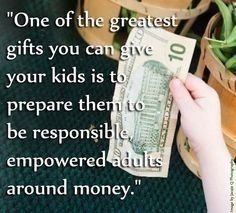FINANCIAL FREEDOM: PRACTICAL LESSONS FOR CHILDREN
June 14, 2021


Financial freedom implies that you get to make life decisions without being overly stressed about the financial impact because you will be prepared.
In order to minimize or avoid the financial entanglements which results in complications in the long run, the behaviour of financial discipline has to be inculcated into children at a tender age.
Showing children how to be financially savvy involves teaching them the basics such as how to budget, earn, spend and save that will establish good money habits for life. Money management is a vital life skill and it is never too early to teach our children about this important life skill.
At a young age, children need to be taken for grocery shopping and given real money to manage for themselves as that enable them to learn responsibility and decision making.
Also, children need to understand the need for saving therefore, from their money they should be able to save, spend and give while being able to explain the rationale behind their decisions. A piggy bank is also a great idea, but teach it visually. Take a clear container and make a big deal about how the container is filling up – the growing aspect of money, having more than the day before.
Furthermore, they should know the benefits of paying bills on time as delaying can attract high interest as well as tarnishing the credit record. Monopoly is a very good game to encourage many different 21st century life skills including strategy that offers ways to manage your money while teaching you about guiding a secure financial future.
Another important lesson that children should be taught at a young age is entrepreneurship, as having a hands-on experience of running an enterprise enables them to grasp lifelong lessons which can come in handy in the long run whether they fail or they succeed.
Financial freedom is a result of a disciplined behaviour premised on the SAVE
, SPEND
and GIVE
notion.

In today’s connected world, young people grow up in a digital society where learning, friendships, and entertainment all happen online. At GIS, we see this not only as a reality to manage, but as an opportunity to empower our learners. Digital citizenship education is about much more than keeping students safe, it is about equipping them to use technology ethically, confidently, and effectively so they can thrive in the digital age. Why Digital Citizenship Matters Every post, click, or share leaves a digital footprint. These footprints can shape a learner’s reputation, relationships, and even their future opportunities. At GIS, students are taught to manage their online presence responsibly and make ethical choices. Through ICT lessons and the use of integrated platforms such as Microsoft Teams, Stasy, MAP, and ADvLEARN , learners don’t just study the theory of online safety, they practise it every day. Each GIS student logs in with personalised accounts, develops strong digital ethics, and is discouraged from behaviours that could lead to cybercrime.

Selecting a school for your child is one of the most important decisions you’ll make as a parent. A good school nurtures not just academic growth, but also social, emotional, and moral development. A good school does not only allow parents to dream of possibilities for their children but also assist in making those dreams become realities! With so many options available, public and private, it’s essential to know what to look for in making this important decision. During your next visit to a prospective school for your precious child, put some consideration towards the following important aspects of a school: 1. A Strong Educational Foundation Check for a clear and balanced curriculum that emphasizes core subjects like reading, math, science, and the arts. Ask about teaching methods and how the school measures progress. Look for schools that promote critical thinking, problem-solving, and creativity. Reputable schools produce excellent results, annually. At GIS we use Guided Readers, a digital platform for Standard 1-3 which gauges the reading ability of individual students. We also use ADvLEARN in Standard 7, Form 1-4 which uses adaptive technology to give tailor-made mathematics exercises to meet students where they are at, building them up to where they should be and beyond! Our campus is equipped with seven ICT labs, five physics/chemistry labs and two robotics labs. Our teachers are all equipped with laptos, projectors and sound bars to bring the class to life! We also have drones, VR-headsets, lazar cutters and 3-D printers – equipping our students to gain valuable experiences, preparing them for the real world! 2. Dedicated and Qualified Staff Meet the teachers and staff. Are they approachable, qualified, and passionate about education? A supportive, well-trained teaching staff can make a huge difference in your child’s learning experience. At GIS, all our teachers are qualified with 25% of our staff holding post-graduate degrees i.e. Masters and Honours Degrees. Another 46% hold degrees i.e. B.A, BEd or BSc. with the remainder of 29% holding a teaching diploma or equivalent. Our teachers enjoy regular training opportunities through our internal training platform, Sirius. Our teachers are thus life-long learners themselves, passionate about education and best-practice. We care about our individual students’ wellbeing and remain in close contact with parents throughout their child’s educational journey with us. 3. Registration, Health and Safety It is imperative to select a school which is registered with the necessary authorities as an operating school. All schools are bound by specific health and safety regulations with proven steps taken to comply. GIS High School is registered with Cambridge. The Primary School is registered with the Ministry of Education for PSLE examinations at the end of Standard 7. Being part of ADvTECH means that the school is subjected to rigorous health and safety protocol with internal and external audits being carried out annually. 4. A Positive School Culture Tour the school to observe the environment. Are students engaged and respectful? Do teachers and administrators seem enthusiastic and caring? A positive, inclusive atmosphere contributes significantly to a child’s confidence and motivation. We are proud to share that GIS-students hail from 32 different countries. We truly celebrate our unique cultures and individual strengths. Even so, we are grounded in Botswana values, taking care of our community and environment. Have a look out for our community service projects and participation in environmental programmes often shared on social media. 4. Student Support and Enrichment Opportunities Look for a school that provides more than just academics—such as counselling services, extracurricular activities, clubs, sports, and arts programs. These contribute to a well-rounded education and help children discover their interests and talents. At GIS, we have an on-site psychologist who assist with academic support and counselling. We also have a dedicated Deputy Principal of Pastoral Care and Discipline, ensuring that students are guided through each phase while reaching their full potential. Students can select from a vast range of extra-mural activities including but not limited to soccer, netball, swimming, athletics, basketball, table tennis, spelling bee competitions, maths Olympiads, debate and moot court. 5. Parental Involvement Strong schools often welcome parent engagement. Whether through regular communication or active partnerships between home and school, it truly supports student success. At the end of every academic term, parents are invited to our campus to meet with their children’s teachers to discuss the term’s progress and results. Parents are also invited to termly Coffee with the Heads of Schools during which important updates are shared. Parents are always welcome to reach out to our teachers and school management to support where needed. Final Thoughts Choosing the right school is a deeply personal decision. Take your time to visit, ask questions, and trust your instincts. Remember: the best school is the one where your child feels safe, supported, and inspired to learn! Allow us to dream with you and assist your child to ascend to their aspirations! You are invited to visit our school and to meet our principals.

At GIS Pre-Primary we follow the Reggio Emilia approach, and we believe that learning flourishes through collaboration among educators, learners, and families. Our environment is designed to spark curiosity, creativity, and meaningful connections. Central to our philosophy is the idea that parents are not just supporters of education but active partners in the learning journey. 1 . Open Communication We prioritize clear and consistent communication. Each term begins with a newsletter outlining key calendar events, followed by timely WhatsApp reminders to keep families informed. Monthly class overviews help parents stay engaged with their child’s learning, identify areas needing support, and collaborate with teachers before new topics are introduced. 2. Meaningful Parent Engagement We actively invite parents into the classroom to observe and participate in hands-on learning experiences. Celebrations like Father’s Day and Mother’s Day are honored, while events such as Sports Day offer opportunities for parents to join in the fun. When children see their parents involved, it reinforces a sense of encouragement and shared purpose, sending a powerful message that their education is deeply valued. 3 . Supporting Home Learning Learning does not stop at the school gate. Through weekend projects and real-world experiences, like gardening, baking, or museum visits, parents help children explore their world. Learners document these moments through photos and videos, fostering reflection, independence, and self-motivation. Watching themselves and their peers engaged in discovery empowers children to take ownership of their growth. 4. Celebrating an Inclusive Community At GIS, we proudly celebrate the diversity of our school community by hosting a range of events at varied times, ensuring that everyone can participate and feel included. Our Family Fun Day is a vibrant example of this, bringing together families from all walks of life to share in the rich cultural heritage, diverse experiences, and unique perspectives that make our school so special. These events not only foster a sense of belonging and connection among families but also create a warm and inclusive environment that welcomes and values every individual. Strong parent–teacher partnerships are the foundation of a thriving learning environment. At GIS, we’re committed to nurturing these connections, ensuring that every child is supported, inspired, and surrounded by a community that believes in their potential.
